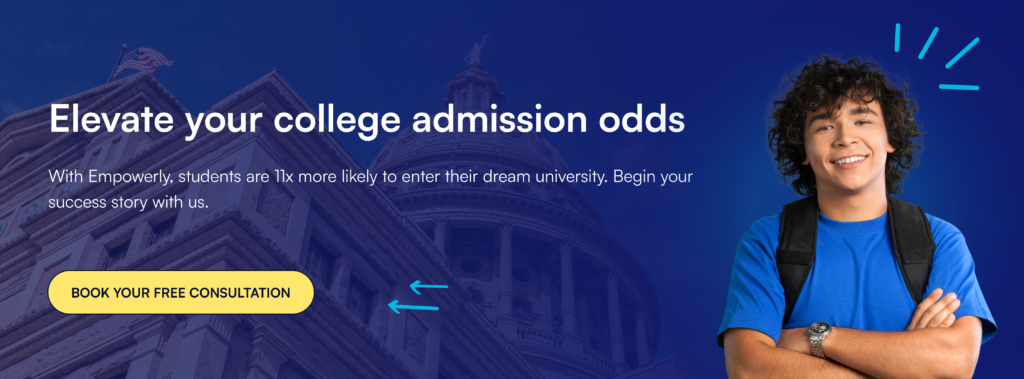As the college admissions process grows more competitive year after year, families are—understandably—searching for any edge to help their students stand out. With acceptance rates dropping and stress levels rising, it’s really no surprise that high schoolers and their parents are turning to every available opportunity for insight and connection—including college admissions events and campus visits.
These in-person experiences have long been a traditional part of the college search. For many students, they offer the first real glimpse into life beyond high school. And for families hoping to make informed decisions (or simply survive the process), they can be incredibly valuable.
But let’s be honest: they can also feel overwhelming.
College fairs, group info sessions, guided tours—if you’re unsure where to begin, it’s easy to feel lost in the crowd. That’s where a bit of strategy makes all the difference. With limited time and energy, students and families need a focused plan that helps them get the most out of every visit, without burning out along the way.
At Empowerly, we know that every student’s journey is different. Between a full class schedule, extracurricular commitments, and the emotional weight of this transition, you’re not expected to figure it all out alone. That’s why experienced college counselors can be so helpful—bringing structure, empathy, and data-informed advice to guide your next steps.
In this article, we’ll walk you through how to make the most of college admissions events and campus visits—from what to expect, to what questions to ask, to how to turn your experience into a strategic advantage when it’s time to apply.
Let’s figure it out, together!

What Counts as a College Admissions Event?
First things first! When we talk about college admissions events, we’re referring to any organized opportunity—virtual or in person—that allows students and families to interact with a college, its admissions team, and sometimes its current students or faculty.
After all, not every student can afford to visit schools across the country—and that’s okay. Many colleges offer fly-in programs, virtual tours, and interactive webinars designed to level the playing field.
Some of the most common types of events include:
1. Information sessions
Typically hosted by admissions staff, these sessions offer an overview of the school’s academic offerings, campus life, admissions process, and financial aid. They’re a great place to ask general questions and hear from the people who review applications.
2. Campus tours
Usually led by current students, these tours give you a firsthand look at the campus environment—classrooms, dorms, dining halls, libraries, and other key facilities. The vibe you pick up here often tells you more than any brochure.
3. College fairs
Held at high schools, convention centers, or virtually, college fairs bring together dozens (or even hundreds) of institutions in one place. It’s a great way to explore a variety of schools at once, especially if you’re early in the process.
4. Departmental events
Some colleges offer specialized sessions for prospective students interested in a specific field (like engineering, business, or the arts). These can give you a deeper look into academic programs, faculty, labs, and facilities related to your intended major.
5. Fly-in programs and admitted student days
Fly-in programs are often competitive and cover travel costs for underrepresented or high-achieving students. Admitted student days are designed to help accepted students make a final decision before committing.
6. Virtual events
Don’t overlook online options. In the wake of the pandemic, colleges have invested heavily in robust virtual programming—webinars, video panels, virtual tours, and student Q&As—that offer flexibility for busy families or those far from campus. You could even use social media to check out student-run TikToks, Reddit threads, or campus vloggers for a student perspective. Visiting in person is great, but it’s not the only way to show interest or gather insight!
With so many formats available, the key isn’t to attend everything—it’s to choose the events that align with your goals and questions.
So, what can these events actually tell you about a college?
What You Can Learn From Attending in Person
Reading a college website can tell you a lot. But there’s no substitute for experiencing a campus in person—or even interacting with real students and staff during a live virtual session. Here’s what you can gain when you show up with curiosity and intention:
A feel for the campus culture
Walking the campus gives you a firsthand look at the living environment—how students dress, how they interact, how crowded the dining halls are. Are students walking together and laughing? Are professors chatting with students outside class? These subtle cues help you get a sense of whether you’d feel comfortable and energized in that community.
Clarity about academic priorities
Some colleges focus heavily on undergraduate research. Others emphasize study abroad, interdisciplinary programs, or hands-on learning. In an information session or departmental visit, you can hear directly from faculty or admissions staff about what makes their academic experience unique.
Student life, explained by students
Tours led by current undergrads can give you insights into the social scene, housing options, dining culture, and campus traditions. Don’t be afraid to ask your guide what a typical weekend looks like, or what they wish they’d known before enrolling (just remember to be respectful).
A stronger sense of “fit”
This word gets tossed around a lot in college admissions, but visiting a campus helps make it real. You’ll notice how it feels to walk through the quad, sit in a classroom, or imagine yourself moving into a dorm. And that intuitive reaction can help guide your final decisions.
Opportunities to ask real questions
From financial aid to major requirements to mental health services, being there gives you a chance to ask about what matters most to you. These personal interactions also show that you’re genuinely interested in learning more about the school.
A chance to demonstrate interest
At many colleges, especially private and mid-size institutions, visiting campus or attending a virtual session can count as “demonstrated interest”—a factor that may influence admissions decisions. (More on this later.)
In short, these events offer more than information—they offer insight. If you’re not sure what to look for or what to ask, don’t worry. In the next section, we’ll show you how to prepare for a visit that’s strategic and stress-free.

How to Prepare for a Successful Campus Visit
Walking into a campus visit or college admissions event without a plan can leave you overwhelmed—or worse, underwhelmed. But with a little preparation, you can turn a standard tour into a meaningful experience that helps guide your decisions and strengthen your applications.
Here’s how to make the most of your visit:
Start with a goal
Before you go, ask yourself: What do I want to learn from this visit? Maybe it’s about class sizes, campus diversity, or how students spend their weekends. Having a few key questions in mind helps you stay focused and engaged throughout the day.
Do your homework
If you’re taking the time to visit, spend some time on the college’s website before you go. Familiarize yourself with academic programs, campus traditions, admissions stats, and anything else that interests you. This way, you can ask questions that go beyond what’s already online—and show admissions staff that you’re serious.
Make a list of questions
Bringing thoughtful questions shows initiative and helps you get answers that matter. Come prepared with a list of topics you want to know more about, covering academics, social life, housing, and more.
Here are a couple of great examples:
- “What’s one thing you wish more prospective students asked about this college?”
- “Can you share an example(s) of how first-year students get involved in [your major/interest area]?”
- “How easy is it to switch majors or combine disciplines here?”
- “What kind of student tends to thrive most at this school?”
Dress comfortably and appropriately
You don’t need to wear business attire, but do aim for neat, casual clothing that’s weather-appropriate and respectful. You’ll likely be walking a lot, so comfortable shoes are a must.
Plan your schedule ahead of time
Many colleges offer more than just tours. If possible, sign up for an admissions info session, attend a class, or schedule a meeting with someone in your intended department. The more perspectives you get, the more well-rounded your impression will be.
Bring a notebook—or use your phone (politely)
Take notes on what stood out to you: a program you didn’t know about, a student story you related to, or a feeling you had walking around campus. These reflections will come in handy later, especially when writing supplemental essays.
If you’re unsure of what to write, after each visit try to write down:
- One thing I loved
- One question I still have
- A moment I’ll remember
- How this school compares to others
- Is this a school I’d want to revisit—or not?
In terms of phone etiquette, it’s mostly common sense. Try not to be texting while others are talking, keep your notifications quiet in the library—you know what to do.
Take respectful photos
Snapping a few photos can help jog your memory, but avoid disrupting the tour or taking photos of students without their consent. Use discretion and focus on capturing things you’ll want to remember later.
A college visit is more than a walk across campus—it’s a chance to ask meaningful questions, gather impressions, and decide whether this place feels like the right fit for you.
Here’s a quick review of Khan Academy’s advice for visiting schools:
What Not to Do During Admissions Events
Just like in the application process, how you show up during college admissions events matters. It’s an opportunity to learn and explore—but it’s also a reflection of your interest, maturity, and approach.
To get the most out of these events, steer clear of these common mistakes:
Don’t ask questions you can easily Google
Questions like “Do you offer a psychology major?” or “How many students attend this school?” won’t help you stand out—and they can signal that you haven’t done basic research. Instead, ask about the student experience in those programs: what support exists for undergraduate research, what internships are common, or how faculty interact with students.
Don’t let your parent do all the talking
Admissions officers and tour guides want to hear from you. It’s fine for parents to ask a few questions, especially if they’re handling logistics, but students should take the lead during conversations and interactions. This shows maturity and personal investment. After all, college is for adults, not kids.
Don’t treat the visit like a casual walk-through
While it’s okay to enjoy the experience, remember that your behavior may be observed. Be engaged, polite, and attentive. This isn’t just a sightseeing trip—it’s a professional opportunity to gather information and make an impression.
Don’t interrupt or dominate group settings
If you’re in a group info session or campus tour, be respectful of others’ time and questions. Share your thoughts and ask questions when appropriate, but avoid monopolizing the conversation or challenging the presenter in ways that come off as argumentative.
Don’t just check the box and move on
Too many students attend a campus visit, snap a few photos, and then forget about it. If you’re going to spend the time and energy to visit, make it count. Reflect afterward: Did the school feel like a good fit? What stood out? How did it compare to others on your list?
Want more tips on what not to do? Empowerly’s short video on college visit mistakes highlights the 3 most common pitfalls—and how to avoid them with confidence!
How These Events Can Help You Strengthen Your Application
Okay, okay. But this all seems like a LOT of work. Why are we doing this again?
College visits and admissions events aren’t just for your benefit—they can also work in your favor when it’s time to apply. With a little intention and reflection, these experiences can become powerful tools to help your application stand out.
Here’s how:
Demonstrated interest
Most top colleges track whether you’ve attended an event, visited campus, or opened their emails. This is called demonstrated interest, and at certain schools, it can factor into admissions decisions. By showing up—either virtually or in person—you’re signaling that you’re truly considering the school, not just adding it to your list at the last minute.
Worried about staying organized? Track your demonstrated interest like a pro with a simple spreadsheet that includes:
- Event date(s)
- College name
- Who you met or emailed
- What you asked or learned
- If you sent a thank-you or follow-up
Material for essays and interviews
A strong supplemental essay often includes specific, personal insights about why a college is a good fit. Details you picked up on a campus visit—like a student’s story, a standout program, or a moment that resonated—can make your response more vivid and authentic. Interviews, too, become stronger when you can reference a real experience or interaction.
Clarifying your college list
Not every visit will reinforce your interest—and that’s okay. Learning that a school isn’t the right fit is just as valuable. Narrowing your list helps you focus your applications, your time, and your energy where it matters most.
Building relationships with admissions staff
When you engage thoughtfully during an info session or follow up with a thank-you email, you’re putting a face and voice to your name. Especially at smaller or mid-size schools, this kind of connection can add a personal layer to your application file.
Reflecting with a counselor
At Empowerly, we often help students debrief after visits—reviewing what they learned, what questions came up, and how to translate those impressions into their college applications. These conversations often lead to stronger essays, clearer direction, and more confident decisions.
So remember: college visits are more than just a box to check—they’re an active part of your admissions strategy. With the right approach, they can sharpen your essays, shape your list, and deepen your understanding of what you want in a school.

Tailoring the Process for Your Student’s Needs
Every student approaches the college search a little differently—and that’s exactly how it should be. While some students are energized by large admissions events, others may prefer one-on-one conversations or quiet observation. Some thrive on packed schedules and full-day tours; others do better with shorter visits and time to reflect.
That’s why there’s no one “right” way to experience a college visit. The key is tailoring the process to fit your student’s learning style, personality, and bandwidth. Here are a few ways to do that:
Be mindful of timing
Try to schedule visits around natural breaks in the school year—spring break, long weekends, or early summer. That way, students can focus on the visit without falling behind in school or rushing through the experience. You’ll also avoid the burnout that can come from cramming too many visits into one trip.
Respect attention spans and emotional bandwidth
Back-to-back tours, long travel days, and a constant stream of new information can wear down even the most enthusiastic students. Build in time to relax, reflect, and recharge between visits.
For students who struggle with loud or crowded settings, big info sessions or campus tours can feel overwhelming. Your comfort matters, and there’s more than one way to connect meaningfully!
Try:
- Requesting a smaller or self-guided tour (many campuses offer these)
- Scheduling a one-on-one info session or phone call with an admissions representative
- Visiting during quieter times (weekdays or early mornings)
- Watching virtual panels and writing questions to follow up via email
Focus on quality over quantity
It’s better to have two thoughtful, intentional visits than five rushed ones. Ask your student which schools they’re most curious about—and why. Prioritize those visits first, and give them space to process their reactions.
More tips for parents?
- Encourage your student to ask their own questions
- Let them take the lead during interactions
- Offer to debrief after the visit, but don’t push
- Ask reflective questions like, “What did you notice?” or “How did it feel?”
- Be a sounding board—not the tour guide
You’re part of the journey, but this is their future. Empower them to own the process! When you meet your students where they are, you give them a better chance to connect with a college in a meaningful way—and to walk away with clarity, not confusion.
Conclusion: Make Every Visit Count—With the Right Support
Hopefully, by now, you agree that college admissions events and campus visits are more than just boxes to check. They’re windows into the next chapter of your life—and some of the most powerful tools you have to make informed, confident decisions.
When approached with intention, these experiences can help students discover what really matters to them in a college, ask meaningful questions, connect with admissions teams, and gain clarity that translates into stronger applications.
Still concerned? Empowerly counselors work with families to personalize the entire college admissions journey—including which events to attend, what to ask, and how to reflect on each visit in a way that strengthens essays, interviews, and final decisions. Whether you’re just starting the process or fine-tuning your final list, we’re here to help make every step more thoughtful, less stressful, and more effective.
Because the right visit, with the right support, can make all the difference.
